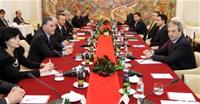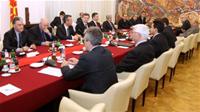Nascent political dialogue in Macedonia
Evelyna Topalova, February 9, 2011
 The leaders' meeting convened by Macedonian President Gjorge Ivanov on February 7th over the opposition's parliamentary boycott did not bring any result as expected.
The leaders' meeting convened by Macedonian President Gjorge Ivanov on February 7th over the opposition's parliamentary boycott did not bring any result as expected.
The only success of the initiative was that Ivanov managed to bring together leaders of the main political parties around the table. The opposition presented its preconditions for returning to Parliament. The stances of the opposition and the ruling parties, however, remained diametrically opposed.
The main precondition, set by the opposition SDSM of former Prime Minister and President Branko Crvenkovski was to unfreeze bank accounts of the A1 TV channel and to release all detained people in connection with a tax fraud investigation, including the TV station owner Velija Ramkovski. The SDSM said that no dialogue would take place and it would not return to Parliament unless this condition was met. Crvenkovski estimated that the decision over A1 was a political one and was taken by the prime minister, so he should interfere to resolve the situation. The TV channel is known for its criticism towards the government.
Prime Minister Nikola Gruevski replied that he could not interfere in the work of the judiciary. He also added that even if early elections were to be called the opposition would boycott them.
Crvenkovski refuted these claims and said the opposition wanted snap elections but several conditions must be met before that - normal functioning of the media in the country to be guaranteed, the voters' list be to updated, elections law to be amended.
Local analysts commented that even if all players accepted the early elections option, the adoption of new election rules could take at least two months. Radio Free Europe says that after that the parliament should be dissolved and elections should be held within 60 days. This means that a snap vote could be expected as early as in June.
The parliamentary boycott not only puts into question the existence of a political dialogue but also endangers the upcoming population census in April. The census issue was among the preconditions set by the ethnic Albanian opposition party New  Democracy (ND). They insist on holding the process in July as otherwise the picture of the ethnic structure in the country will not be complete. The ND say the census should be carried out in July in order Albanians working abroad to be included in the process.
Democracy (ND). They insist on holding the process in July as otherwise the picture of the ethnic structure in the country will not be complete. The ND say the census should be carried out in July in order Albanians working abroad to be included in the process.
SDSM's conditions to end the parliamentary boycott are clear. Now the party should decide how to react after a court in Skopje unblocked on February 8th A1's bank accounts. As we remember this was their main precondition to return to Parliament and to resume political dialogue.
 Bakir Izetbegovic, Andrej Plenkovic | © Council of the EU
Bakir Izetbegovic, Andrej Plenkovic | © Council of the EU Aleksandar Vucic, Recep Tayyip Erdogan | © Serbian Presidency
Aleksandar Vucic, Recep Tayyip Erdogan | © Serbian Presidency Jean-Claude Juncker, Zoran Zaev | © European Commission
Jean-Claude Juncker, Zoran Zaev | © European Commission